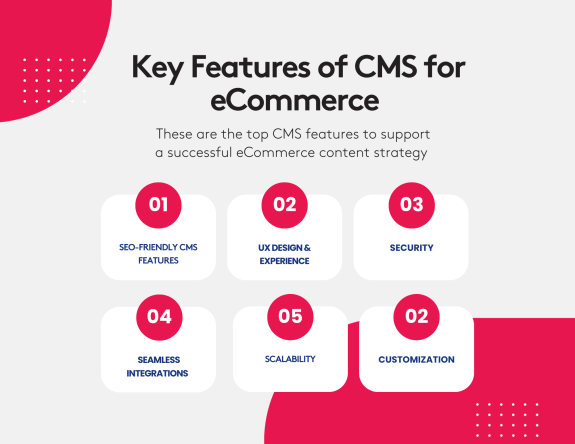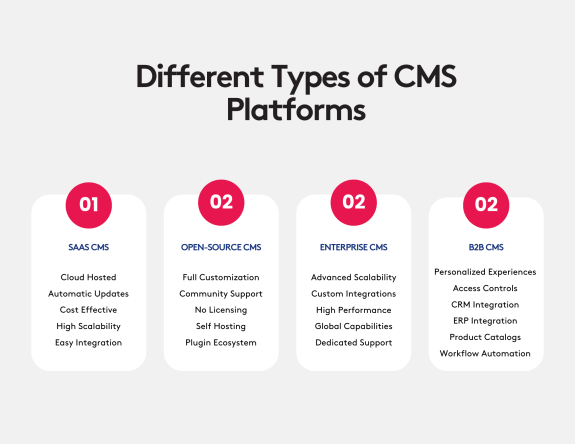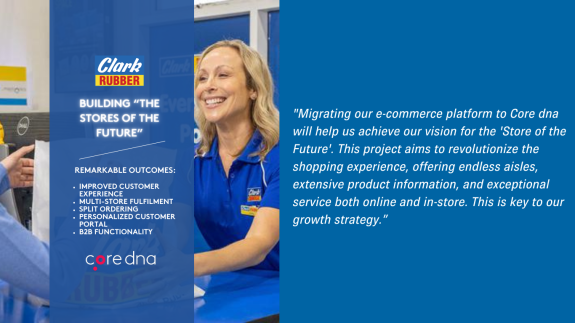Expert Guide to Choosing the Best eCommerce CMS

Creating an omnichannel content strategy supported by a robust eCommerce CMS is critical to achieve higher conversion rates. For so many eCommerce brands, content represents an essential part of their strategy. But when we talk about content, we should not narrow it down to influencers and social media.
This is where eCommerce CMS comes in play. It integrates your online store into your omnichannel content strategy; making a channel not just and end goal.
What’s holding businesses back from being unique and experimental with the ways they use content on their website? More often than not, it’s the limitations of the eCommerce CMS solution an online store has chosen.
In this blog post, we’re breaking down what to look for when evaluating a CMS for eCommerce. We're deep diving into the different types of platform available and compare the best CMS for eCommerce
Key Takeaways
- Prioritize Omnichannel: The right eCommerce CMS integrates seamlessly into an omnichannel content strategy, significantly boosting conversions and customer engagement.
- Must-Have Features: Look for an SEO-friendly, highly customizable, scalable, secure, API-first CMS to support growth and enhance customer experience across channels.
- Evaluate Platform Types: SaaS, open-source, enterprise, and B2B platforms each have distinct pros and cons; select based on your business needs, technical resources, and future scalability requirements.
- Headless CMS Advantage: A headless CMS strikes a balance between robust content management and flexible eCommerce features, providing agility and adaptability as your business evolves.
On this page:
What an eCommerce CMS?
CMS stands for Content Management System. The system allows teams to manage all type of content for different channels: mobile, website, IOT etc. The content can be text, videos, product information, tables, voice and more.
More often than not, an online store will require an integrated CMS and eCommerce platform. These platforms offer a mix of content features and eCommerce tools, like order and inventory management, plus payment gateways.
Most eCommerce businesses focus on product pages and checkout processes. However, if you want to create a true omnichannel user journey and your content strategy to shine, don’t ignore the value of a CMS.
This is why choosing an eCommerce CMS wisely is important. Businesses will find that an upfront investment in researching a CMS is money well spent.

So, What are the Key Features to Look For in an eCommerce CMS
If your are looking for the best content management system for online stores, then these 6 features should be on top of the list when it comes to your evaluation.
SEO-Friendly CMS Features
For content-driven eCommerce brands, SEO is important. Businesses that rank top on the SERPs (search engine results pages) attract the majority of the clicks and higher number of visitors.
In fact, according to SEO company Semrush, just 1% of users click through to the second page on Google. As a result, eCommerce brands who don’t have SEO features in their content management system will find it difficult to make sales.
A high-performing CMS for ecommerce must have robust SEO features that help content perform well. These features could include SEO-friendly meta tags and URLs, great mobile responsiveness, and third-party plugins to help you optimize your on-page text.
Excellent UX Design & Experience
Getting your customers to your website is just one part of the problem. Next, a good CMS system needs intuitive, user-friendly design to keep them hanging round. This is where UX, or user experience, comes in. But it’s not so simple as just a few well-designed features on your blog page.
An intuitive, optimized CMS should have space for diverse content types like videos, gifs, and more. Then, it should include content at key touchpoints through the customer journey. Ultimately, a content management system should be able to give customers the kind of content they need precisely when they want it. This might mean buyer’s guides on the category pages or instruction videos that pop up to showcase unique product features—just at the moment the customer needs that information.
Even more importantly is choosing mobile-friendly CMS for online stores. In 2024, 77% of online eCommerce traffic comes from mobile devices. Mobile optimization is truly non-negotiable.
Customization Options
Content requirements are as diverse the eCommerce brands themselves. From a simple blog to a complete omnichannel content strategy, eCommerce brands need an eCommerce CMS that helps them grow.
It should let them share content across all the channels their choose while giving them a centralized management portal to oversee it all.
This is a reason why all businesses, regardless of size, should choose a customizable CMS for eCommerce.
While popular platforms like WordPress offer personalization, this comes at a price. Open-source platforms are subject to security issues and the plugins trap can make your eCommerce site clunky and slow.
Businesses should consider what is important for them, and map out their entire tech stack before they buy.
Robust Security Features
In today’s security-conscious online world, selecting a secure CMS for eCommerce is so important. Not only to protect your customers’ data, but also to protect your own.
As a result, online stores looking to put in place a CMS system need to look for OOTB security features. Among other things, this could include Two-Factor Authentication, SSL Certificate support, plus compliance with the Payment Card Industry Data Security Standard.
An eCommerce CMS should also be easy to maintain and regularly reviewed. This might mean finding an in-house development team or sourcing an external vendor you can trust to review and maintain your site. At the outset, this should be factored into your budget and your project timeline.
SaaS platforms provide a secure CMS for eCommerce option. They meet all regulations and perform regular audits to give brands' peace of mind.
API-first CMS for Seamless Integrations
Next to consider is how well your eCommerce CMS will integrate with other tools in your tech stack.
While all CMS for eCommerce will promise some form of integration, some of them are inevitably easier to integrate than others. API-first CMSs will offer more extensive integrations to create a cohesive ecosystem.
On the other hand, sites like Squarespace and wordpress offer integrations on the surface. But every plug-in has an extra cost and adds a layer for vulnerability.
Scalable Build
Online stores rarely stay static for long. Will your new CMS be able to cope with adding new product lines, increasing customer demand, and high volumes of traffic?
Businesses must choose a scalable eCommerce CMS to save themselves headaches down the road. Choosing a simple, cheaper option now might mean spending more money over the long term once expensive migrations are factored in as the business grows.
To check this, look to see the difference between pricing models and bandwidth. Will you end up paying above the odds if your visits and customers suddenly spike? Search for reviews. Have other online businesses had trouble meeting peaks in customer demand due to the limitations of their CMS? This is a warning sign.

Breaking Down the Different Types of CMS Platforms
Ultimately, a CMS for eCommerce should be able to fit into your business easily. It needs to grow with you, and adapt to your varying needs, all while keeping your customer and business data safe.
But there might also be specific things to look for if you are a specific type of business. Let’s break down some of the most common use cases for an ecommerce CMS.
SaaS CMS Platforms
Software as a Service or SaaS CMS platforms are great for businesses that want a hands-off approach. A SaaS CMS for eCommerce offers online brands a ready to use platform with scalability and support.
SaaS is always a great choice for marketing and eCommerce teams without an in-house developers.
Plus, an SaaS CMS for eCommerce is often a one-stop-shop for your content management, with just one monthly fee. Look for SaaS CMS platforms that offer built-in SEO tools, mobile responsiveness, and reliable customer support.
Make sure your new platform has strong integration capabilities with other SaaS tools (like CRM, email marketing, and analytics software) to manage your workflow.
SaaS CMS for eCommerce are our best choice for scaling online stores content. They give brands an extensive platform of tools to build great eCommerce content without a large (and expensive) IT team.
Open-source eCommerce CMS
Open-source CMS platforms for eCommerce give businesses great flexibility and control over their platform. However, they require technical knowledge and team support.
Open-source platforms offer access to the underlying source code which allows developers to tailor the platforms to the needs of each eCommerce store.
While open-source can be great for businesses with unique needs, it is good to keep in mind that these platforms don't have dedicated support or teams to be accountable for the software.
The responsibility of security, hosting and maintenance relies solely on the eCommerce business.
Businesses that take on such project will need to have a good team of developers to make sure they are on top of tasks such as hosting setup, version updates, and security patches .
Enterprise eCommerce CMS
On the other hand, enterprise-level companies require a CMS that provides robust customization, security, and scalability. For an enterprise business, high-vol transactions and complex workflows are par for the course, meaning that a simplified CMS won’t cut it.
Instead, a CMS platform for large ecommerce sites needs to connect seamlessly with an ERP and a CRM system, offer omnichannel content distribution, and be able to scale infinitely, with a content platform that your marketing and sales teams never outgrow,
B2B Ecommerce CMS Platforms
For B2B ecommerce businesses, an OOTB platform won’t cut it. B2B companies need specific requirements, like bulk ordering, specialist pricing, and account-based purchasing.
A B2B focused CMS will offer these features and more, helping your company streamline operations, nurture client relationships, and improve the customer experience for business buyers
Choosing a headless B2B ecommerce CMS is a great choice here. An API-first platform helps B2B businesses deliver seamless, personalized experiences for their customers across multiple channels, such as websites, account portals, and mobile apps.
Then, the headless architecture makes it flexible to use for businesses that have an extensive product catalog and complex B2B requirements.
Best eCommerce Platform Comparison
Now that we understand a few use cases, let's dive into the top eCommerce CMS platforms comparison.
This comparison table will help give you a clearer view on what features the best CMS for online stores should offer.
eCommerce-First vs Content-First CMS Platforms
When making the choice, you might find yourself asking, ‘What’s more important: the ecommerce functionality, or the content offerings?’
This question boils down to choosing an ecommerce-first vs a content-first CMS Platform. The answer really depends on your business priorities.
- eCommerce-first refers to an optimized CMS for product management. These platforms are great for businesses that are focused on selling products with complex operations. While they do include content features that enhance product pages, these are secondary.
- Content-first on the other hand is the opposite. These CMS systems, while they might offer ecom features, are better for SEO, video and media content. They also bring more flexibility across content types. That makes this a great choice for brands where storytelling, brand engagement, or content marketing are central.
Ultimately, the best choice for many businesses lies somewhere in the middle. That’s why the best solution is usually a headless CMS. These CMS systems mix great content management with reliable, scalable eCommerce features across many channels.

The Future of CMS
So, whether you’re a small business, a growing ecommerce brand, or a large B2B enterprise company, CMS is best for your online store is no easy task.
Make sure you check that the content management systems fit within your business model, evaluate key features and the ease of use. Don't over look the support each CMS for eCommerce platform offers and that their commitment to your success is as important as yours.
But one thing for certain, the need for businesses to generate content isn’t going away any time soon. Human-first content is becoming even more important for consumers, as they look to brands who stand out via their content.
For that reason, the future of eCommerce CMS systems is even more integrated, even more customizable, and even more unique.
Clark Rubber, an 80-year-old franchise brand integrated a CMS to their eCommerce and doubled its revenue online.
By creating educational content within their product category pages, they helped the customer make more informed decision and purchase.
Read more about Clark Rubber's digital transformation with Core dna.














